2022 Digital Law Forum
February 15 - 16, 2022 | Online Event
February 15-16 2022 Digital Law Forum: Artificial Intelligence and the Law: Myths & Reality
The Digital Law Forum puts a spotlight on the state of Artificial Intelligence and the Law in Canada. It invites discussion of the institutional design challenges that digital technology governance raises for societies that currently rely on the rule of law. The first day will address how the laws regulating software affect freedom, wealth, and power, with AI as a case study to focus a discussion of present and emerging issues affecting the development of law and technology. The second day will provide a forum for imagining possible responses to such issues in research and practice.
It brings together law, technology, and governance reform experts for an interdisciplinary look at legal liability, regulation and the reform of public institutions in a digital age. If you are curious about the challenges and opportunities that AI and other digital technologies pose for access to justice and decision making that affects the public, this forum is for you. Together, we will examine who might be responsible for risks and harms introduced by AI, and what opportunities digital technologies present as well.
Day 1 is focused on gathering knowledge and shared context about AI and the Law from keynote speakers and panelists.
Day 2 is about moving ideas into action: come share your ideas, and figure out the nuts and bolts of using Alberta’s Innovation Sandbox along with other supports for legal innovation, access to justice projects, research projects, law reform, and more ways to get involved in law and tech efforts in Canada.
Speakers
Masters of Design (M.Des), Strategic Foresight + Innovation Juris Doctor (J.D), University of Victoria Law Medina is a former Service Designer with Justice Digital, an initiative in the Government of Alberta's Digital Innovation Office. Before attending law school at the University of Victoria, she obtained a Masters of Design in Strategic Foresight & Innovation in Toronto and worked as a consultant with tech startups and large corporations. She is currently an Articled Student at Crabtree Law in Vancouver, British Columbia. She has a special interest in bioethics, charter rights, and access to justice.
Medina Abdelkader
Masters of Design (M.Des), Strategic Foresight + Innovation
Juris Doctor (J.D), University of Victoria Law
Medina is a former Service Designer with Justice Digital, an initiative in the Government of Alberta's Digital Innovation Office. Before attending law school at the University of Victoria, she obtained a Masters of Design in Strategic Foresight & Innovation in Toronto and worked as a consultant with tech startups and large corporations. She is currently an Articled Student at Crabtree Law in Vancouver, British Columbia. She has a special interest in bioethics, charter rights, and access to justice.
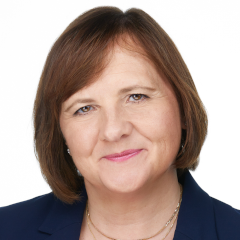
Dean Barb Billingsley
Dean, University of Alberta Faculty of Law
Barbara Billingsley was appointed Dean of the Faculty of Law, effective July 1, 2020. She has been a faculty member at the University of Alberta Faculty of Law since 2001 and has served the Faculty as the Associate Dean (Graduate Studies) and as the Associate Dean (Research). Her current areas of research and teaching include insurance law, civil litigation processes and constitutional law issues pertaining to private law matters. Barbara Billingsley holds undergraduate (B.A.) and law degrees (LL.B. and LL.M) from the University of Alberta.

Dominique Bohn
Digital Innovation Office Government of Alberta
I am thrilled to be leading the Government of Alberta's Digital Innovation Office. Established in July 2018, we are a small cross-disciplinary team working to make government services better, for the people who use them, and those who deliver them. Mostly using the internet. The DIO accelerates service improvement by delivering exemplar projects alongside government program areas, cultivating digital talent, and providing meaningful guidance. We will find new value in government’s IT investment, improve end-to-end citizen experience and service efficiency, and help the GoA be the employer of choice for digital professionals.
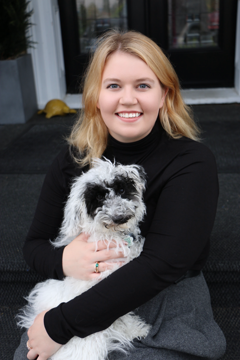
Chloé Currie
Masters Student at the Balsillie School of International Affairs
Chloé Currie is a Masters of International Public Policy student at the Balsillie School of International Affairs through Wilfrid Laurier University. She also obtained her undergraduate degree in History from the University of Edinburgh in June 2021. Currently, she serves as the Director of Content at the student-led coalition Encode Justice Canada which focuses on the justice and of artificial intelligence use. Chloé hopes to continue her work in artificial intelligence through a future career in public policy.
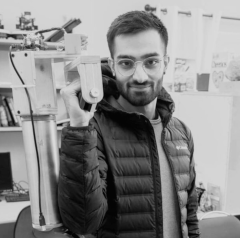
Inder Dhiman (co-presenting with Raj Oberoi)
Co-Founder, River City Venture Legal Services Centre
Inder is currently a first-year student at the University of Alberta in the JD program. Prior to law school, Inder completed his undergraduate degree in Mechanical Engineering. Academically, his focus was on robotics and green energy. Professionally he gained experience in the Petrochemical, Oil and Gas, and Valve industries. With a passion for technology, he is very excited to help entrepreneurs, innovators and thinkers build their dreams with the help of the River City Legal Services Centre. Outside of the office, Inder loves to play and coach soccer, ride his motorcycle in the summer and talk about watches, cars and anything tech-related.
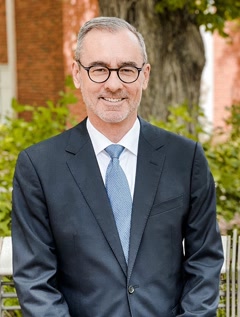
President Bill Flanagan
President and Vice-Chancellor at University of Alberta
Bill Flanagan is the 14th president and vice-chancellor of the University of Alberta. Under his leadership, the university is embarking on a major program of academic and administrative restructuring guided by the University of Alberta of Tomorrow proposal, his five-year vision for the university. Through his ambitious plan, the U of A will more efficiently deliver on its core mission and become a stronger driver of economic growth, innovation and creativity in our province and beyond.
Born and raised in Alberta, Professor Flanagan holds a BA (English and Philosophy) from Carleton University, a JD from the University of Toronto, a DEA in International Economic Law from Université Paris I-Sorbonne, and an LLM from Columbia University. He joined the Faculty of Law at Queen’s University in 1991, where he founded the faculty’s International Law Program at the Queen’s University Bader International Study Centre at Herstmonceux Castle in the U.K. His scholarly work spans property law, corporate law and international trade law.
Serving as dean of law from 2005 to 2019, he is known for his transformative and entrepreneurial leadership. He oversaw the establishment of the faculty’s PhD program, the founding of the Centre for Law in the Contemporary Workplace, a major expansion of the business law program, an online undergraduate Certificate in Law Program, an online Graduate Diploma in Legal Services Management, and a forthcoming new online Graduate Diploma in Immigration and Citizenship Law. During his tenure as dean, he expanded the faculty complement by 25 per cent, diversified the composition of the student body, and increased annual donor support more than fivefold. In recognition of these achievements, law alumni contributed more than $550,000 in donations to create an endowed fund in his honour that supports international studies at Queen’s Law. In addition to his service as dean, Professor Flanagan has an extensive record of leadership and engagement at Queen’s University and in the broader community. He was president of the Council of Canadian Law Deans from 2011 to 2014, and served on the National Action Committee on Access to Justice in Civil and Family Matters. He was closely involved in the successful implementation of a new budget model at Queen’s, the development of the University Strategic Framework (2014-2019), and a comprehensive overhaul of the university’s Student Code of Conduct. Professor Flanagan’s work in support of HIV/AIDS research and initiatives has made him a well-recognized and respected public figure. He currently serves as chair of the Canadian Foundation for AIDS Research’s National Working Group, and has served as board chair of the AIDS Committee of Toronto—Canada’s largest community-based HIV service organization—as well as on the Ontario HIV Treatment Network and Canada AIDS Russia Project. In recognition of his community service, he was named to the Honour Roll of the Ontario AIDS Network in 2011. Bill Flanagan is married to his husband Saffron Sri, a registered dietitian who works in the health-care sector.
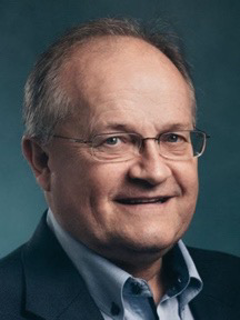
Professor Randy Goebel
Professor of Computing Science at the University of Alberta
Randy Goebel is interested in the logic of machine learning, employing non-deductive reasoning to build theoretical models that accurately describe and predict the world. He is a Professor of Computing Science at the University of Alberta, and Directory of the Explainable AI Lab (XAI Lab). He was one of four original founding researchers of Amii and currently is a Fellow and sits on the Amii Board of Directors. He is also a member of the scientific advisory board of DFKI (the German Institute for AI) and sits on the National Program Committee of the Pan-Canadian AI Strategy. He is an advisor to several companies around the planet, in the UK, Germany, Japan, Korean, and the USA. Randy has supervised more than 80 early-stage researchers at the MSc, PhD and Post-doctoral Fellow levels, and he has published more than 200 publications including refereed and invited papers and publications in books. He is a highly-regarded speaker, having delivered talks at academic conferences and institutions as well as businesses and governmental organizations around the world.

Professor James Grimmelmann
Tessler Family Professor of Digital and Information Law at Cornell Tech and Cornell Law School
James Grimmelmann is the Tessler Family Professor of Digital and Information Law at Cornell Tech and Cornell Law School. He studies how laws regulating software affect freedom, wealth, and power. He helps lawyers and technologists understand each other, applying ideas from computer science to problems in law and vice versa. He is the author of the casebook Internet Law: Cases and Problems and of over fifty scholarly articles and essays on digital copyright, content moderation, search engine regulation, online governance, privacy on social networks,, and other topics in computer and Internet law.
He holds a J.D. from Yale Law School and an A.B. in computer science from Harvard College. Before law school, he worked a programmer for Microsoft; after graduation, he clerked for a federal appellate judge. He is an affiliated fellow of the Yale Information Society Project. He previously taught at New York Law School, Georgetown, and the University of Maryland.
He has written for Slate, Salon, Wired, Ars Technica, and Publishers Weekly; he is a regular source of expert commentary for major news media including the New York Times, the Wall Street Journal, the Washington Post, and All Things Considered. He and his students created the Public Index website to inform the public about the Google Books settlement.
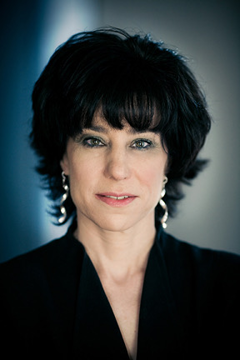
Maura Grossman
Research Professor at University of Waterloo, Adjunct Professor at Osgoode Hall Law School of York University, Affiliate Faculty at the Vector Institute
Maura R. Grossman, J.D., Ph.D. is a Research Professor in the David R. Cheriton School of Computer Science at the University of Waterloo, an Adjunct Professor at Osgoode Hall Law School of York University, and an affiliate faculty member at the Vector Institute, all in Ontario, Canada. She also is Principal of Maura Grossman Law, an eDiscovery law and consulting firm in Buffalo, New York. Maura is most well known for her scholarly work on technology-assisted review (“TAR”), which has been widely cited in the case law, both in the U.S. and abroad, and for her appointments as a special master or expert in multiple high-profile U.S. federal and state court cases.
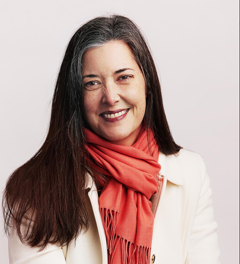
Justice Avril Inglis
Justice, Court of Queen's Bench of Alberta and Co-Chair of the Court's Information Management/Information Technology Committee
Justice Inglis began her legal career in Winnipeg, after graduating with her B.A. and her Ll.B. from the University of Manitoba. She articled and practiced one year with Manitoba Prosecutions before she moved to Edmonton. She practiced as a prosecutor for Alberta Justice, eventually focusing on serious and violent crime, in particular sexual assaults and murder. She is known as one of the prosecutors in the Mark Twitchell trial, AKA the Dexter Copycat murderer. Justice Inglis was appointed to Queen's Bench in 2016.
Justice Inglis has been a "sophisticated user" of information technologies throughout her practice of law and now as a sitting Justice. She advocated for digital disclosure as a prosecutor which is now standard practice. Eventually she shifted to paperless trials, using digital files, PowerPoint presentations and taking type-written notes while examining witnesses. As a Justice she has used the same tools to manage information flow, whether in Chambers or during a trial. She sees the intentional shift of her court to modern management of information, attendance and communication to be key to improving access to justice. Many of the changes that were required by the COVID-19 pandemic have been effective in the short term; Justice Inglis' is certain that her Court's commitment to digitization will build on those processes for a more effective and practical approach to service to the profession and the community.

Katrina Ingram
Ethically Aligned AI
Katrina Ingram is the Founder and CEO of Ethically Aligned AI, a company focused on helping organizations to drive better outcomes in the design, development and deployment of AI systems. A seasoned executive, Katrina has over two decades of experience running both not for profit and corporate organizations in the technology and media sectors. She is a member of IEEE, and volunteers with several AI ethics organizations including Women in AI and Ethics (WAIE), For Humanity and All Tech is Human. Katrina holds an undergrad in business administration from Simon Fraser University and a master of arts in communications and technology from the University of Alberta. She combines her love of audio and interest in AI as the host of the podcast, AI4Society Dialogues. Katrina was recently named to the top 100 Women in AI Ethics list for 2022 and has launched a new AI ethics micro-credential with Athabasca University.
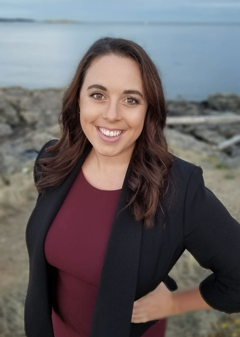
Lauryn Kerr
BC’s Civil Resolution Tribunal
Lauryn Kerr is in house legal counsel for the Civil Resolution Tribunal (CRT). The CRT is Canada’s first fully online administrative tribunal. It currently handles small claims disputes under $5,000, motor vehicle accident claims, and certain matters involving condominiums, registered societies, and co-operative associations. Lauryn’s background is in innovation, technology and transformation. She earned her Juris Doctor from the University of Victoria, and her Master of Laws (LLM) from Osgoode Hall.
Lauryn has instructed at the University of Ottawa and Thompson Rivers University in the field of technology and access to justice, and from 2018-2020 she also taught a course in law, innovation, technology and justice at the University of Kharkiv, Ukraine. Lauryn is a frequent presenter on the topics of access to justice, legal technology, and innovation, both within Canada and internationally. She has been on the board of directors of the Justice Education Society since 2016, and is particularly interested in the intersection between technology, access to justice, and international legal development.

Professor Mi-Young Kim
COLIEE Co-organizer,
Assistant Professor of Computing Science
Augustana Faculty, University of Alberta
Mi-Young Kim is an assistant professor of Computing Science at University of Alberta, Augustana Campus. Her research interests are Artificial Intelligence, Natural Language Processing, and Text Mining. Her current research topics are legal information extraction from legal texts and medical information extraction from health records. She has been serving as a co-organizer of the International Competition on Legal Information Extraction and Entailment (COLIEE) since 2014, and her team won the statute law information entailment task in the competition every year from 2014 to 2019.

Colin LaChance
Co-Founder and CEO, Compass.law
In every circle that makes up the Venn diagram of Colin’s current activities, you’ll find a “legal information as data” focus. With a career spent at the intersection of law and technology, Colin has developed pronounced expertise in legal tech SaaS through leadership, founding and entrepreneurial roles at influential organizations providing legal research and analysis solutions.
Profiled by the ABA Journal as a "Legal Rebel" (2014), by Canadian Lawyer Magazine as among the "Top 25 Most Influential" of 2014, and by Fastcase as a member of the 2013 Fastcase 50 class of legal innovators and visionaries. Colin served as CEO of the Canadian Legal Information Institute (CanLII) from 2011 to 2015, where he developed and successfully executed its first independent multi-year strategic plan and expanded its operations to include high-quality secondary sources. A frequent writer and speaker to national and international audiences on legal tech/information/innovation topics, and very active in supporting the development of legal information and technology projects through advocacy, consulting, business development and advisory services for courts, law associations, legal publishers and startups. Prior roles included senior legal, advocacy, marketing and lobbying roles in the telecommunications industry. Now a “non-practising” lawyer following 20 years of practice. Finally, although an average and unimpressive student in all his schooling, Colin also added an LLM in law in technology in 2013 to degrees in law and business earned in the bloom of youth. UAlbertaLaw LL.B ‘97 and non-practicing member of the Law Society of Alberta.
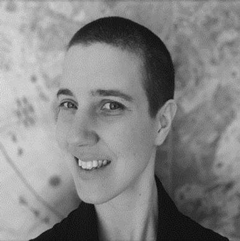
Hero Laird
President, Digital Law & Innovation Society
Hero currently serves as a Board Member of Volunteer Alberta, a Steering Member of Powered by Data, the founding President of the Digital Law & Innovation Society, and an Alberta Machine Intelligence Institute WomeninAI Mentor. They work with the Canada School of Public Service (Government of Canada), leading development on ways to effect great people exchange for the GC and other organizations. They are a serial social entrepreneur and inveterate collaborator – a co-founder of Connect the Sector, a start-up staff member of the Ontario Nonprofit Network (ONN), and co-founder of the River Valley Free School, a skills sharing community in Edmonton, on Treaty 6 territory, where they live. Hero is currently pursuing a law degree at the University of Alberta. They rock climb, meditate, art and cuddle with family to stay sane. Pronouns: any *this means you can’t go wrong :)
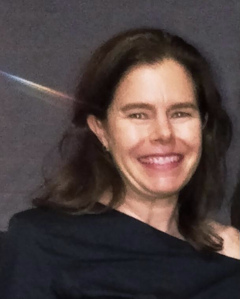
Leslie McCallum
Lexata Founder and CEO
Leslie is the Founder & CEO of Lexata; a legal technology company focusing on North American capital markets regulations. Lexata's mission is to speed up research on securities laws for public companies, investment dealers and their law firms.
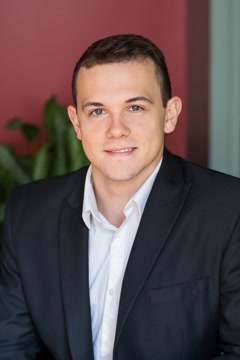
Mark Likhten
Lawyer, Strategy and Legal Innovation Lead at the Cyberjustice Lab
Mark Likhten is strategy and legal innovation lead at the Cyberjustice Laboratory of the Université de Montréal’s Faculty of Law. He has been working for several years as legal advisor in the field of information technology for companies both locally and internationally. Mark coordinates various projects and collaborates with the Laboratory's partners in the private and public sectors around digital transformation. He also drives the development of technological tools for justice and contributes to the research on cyberjustice on a regular basis.
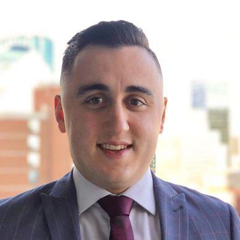
Raj Oberoi
Vice President, External of the Digital Law & Innovation Society
Raj is currently the Vice President, External of the Digital Law & Innovation Society. Prior to law school, he had a career with the Government of Canada, writing speeches and following the happenings on Parliament Hill. A graduate of Carleton University’s Criminology program, Raj has worked as a junior hockey referee and a number of other positions in the local sports community.
He is interested in exploring how technological evolution will change the practice of law – not just in terms of how lawyers practice law, but the kinds of clients they will represent.
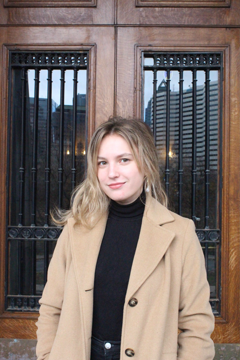
Sara Parker
Director of Encode Justice Canada, Political Science Student at McGill University, Research Assistant at Network Dynamics Lab
Sara Parker is a Political Science student at McGill University, a research assistant at the Network Dynamics Lab, and the Director of Encode Justice Canada. EJC is a youth-led organization that advocates for justice in tech by engaging students across Canada in the essential conversations about Artificial Intelligence through educational content, workshops, and outreach. As the lines between the digital and “real world” blur, EJC believes we must examine the effects technology has on our everyday lives. Young people, who have grown up with social media and handheld computers in their pockets, understand these impacts better than anyone; EJC's initiatives therefore target Canadian youth and facilitate their inclusion in the AI ecosystem.
Sara's work with EJC focuses on ensuring that Canadians understand how AI influences their lives and empowering them to push the future of tech in the right direction, while her academic and professional work centers on the politics of tech. She has spoken about the social and political effects of AI at the University of Toronto, the University of Washington, Simon Fraser University, McGill University, and Stanford University.
To learn more about EJC, visit encodejustice.ca or follow @encodecanada on Twitter and Instagram. Sara can also be found on Twitter, @s_j_parker.

Len Polsky
Manager, Legal Technology & Mentorship Law Society of Alberta
Len is originally from Montreal where he earned Bachelor of Commerce, Bachelor of Civil Law and Bachelor of Common Law degrees from McGill University.After graduating, he studied in The Hague and worked at a law firm in Geneva, Switzerland. When he returned to Canada, it was in Alberta that he put down his roots.
Len was in private practice for almost 30 years and was Managing Partner of his own litigation boutique firm where his practice focused on complex commercial litigation and employment law disputes. The insight he developed serving as legal counsel gave him first-hand knowledge of the challenges and opportunities that practicing law presents and helped him understand the many ways that innovation and technology can level the playing field and improve the delivery of law. Today he serves as the Law Society of Alberta’s Manager of Legal Technology & Mentorship. He is responsible for developing, implementing and managing the Law Society’s practice technology programs and is a member of the Innovating Regulation Group overseeing the rollout of the Law Society’s Innovation Sandbox project. He also established and directs the Mentor Connect, Mentor Express and Locum Connect programs for lawyers in Alberta.

Juliano Rabelo
Director of Data Science in AltaML
Juliano Rabelo is the Director of Data Science in AltaML. He has bachelor, masters and doctorate degrees in Computing Science/Artificial Intelligence, and is a Postdoc Fellow at the University of Alberta since 2018. Juliano has 20 years of industry experience in applied research and software development working for companies in Brazil, USA and Canada. Being passionate about languages and how they are applied in real-world problems, Juliano's current research focus is on Natural Language Processing, Machine Learning and Explainable AI applied to text.

Professor Amy Salyzyn
University of Ottawa
Amy Salyzyn is an Associate Professor in the Faculty of Law, Common Law Section at the University of Ottawa and a Faculty member of the Centre for Law, Technology and Society. She received her J.S.D from Yale Law School for her dissertation exploring the judicial regulation of lawyers in common law jurisdictions. She also received her LL.M. from Yale Law School and her J.D. from the University of Toronto. She has written extensively in the area of legal ethics, lawyer regulation, the use of technology in the delivery of legal services and access to justice. Amy is currently the President of the Canadian Association for Legal Ethics.

Kyla Sandwith
Founder of De Novo Inc.,
University of Alberta Law Alumni
Kyla Sandwith is a lawyer and the Founder of De Novo Inc. With over 20-years legal industry experience and a Masters in Law Firm Management, Kyla has a passion for legal operations and technology.
Kyla and her team collaborate with clients across the industry to streamline, simplify, and improve operational performance.
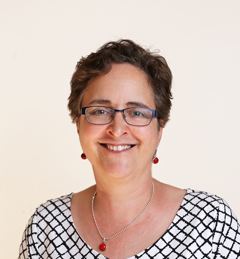
Teresa Scassa
University of Ottawa
Dr. Teresa Scassa is the Canada Research Chair in Information Law and Policy at the University of Ottawa, Faculty of Law. She is a member of the Center for Law, Technology and Society at the University of Ottawa, where she is part of the Scotiabank AI & Society Initiative. Teresa has served on a number national and provincial advisory panels on law and technology related issues. She has written widely in the area of privacy law, data governance, intellectual property law, law and technology, artificial intelligence, and smart cities. She is a co-editor of the books AI and the Law in Canada (2021), Law and the Sharing Economy (2017), and The Future of Open Data (2022). She is co-author of Digital Commerce in Canada (2020) and Canadian Intellectual Property Law (2013, 2018 and 2022).

Var Shankar
Senior Manager for Policy at the Responsible AI Institute
Var Shankar is the Senior Manager for Policy at the Responsible AI Institute (RAII), an organization dedicated to creating practical tools to advance trusted AI. He works closely with member organizations, RAII Working Groups and the World Economic Forum’s Global AI Action Alliance.
Var is passionate about using public policy and emerging technology to improve people’s lives. He is an Instructor, along with Google’s Alexis Cook, of Kaggle’s Intro to AI Ethics course. Var previously worked at the Clinton Global Initiative and practiced law at Cravath, Swaine & Moore LLP. Var holds a J.D. from Harvard Law School and a B.A. from Duke University.
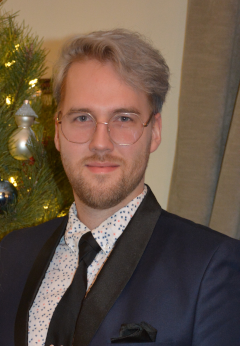
Nicholas Siennicki
I was raised between here and Poland, and learned to occupy myself during those long flights with writing. I adore creative pursuits, and spend much of my free time indulging in the arts and art criticism. I am that pretentious. yes. I've learned to embrace it. To that end, I completed an undergraduate degree double majoring in Latin and English. In law, I joined a variety of clubs and volunteer experiences, including SLS, ECLC, PLE and of course, the Digital Law & Innovation Society. Law has often been a boundary testing exercise for me, and I am often found wanting of more time/skill/talent/conscientiousness. But I love learning, so it has been a fun process. This past summer, I taught with a fulfilment branch of WCB and next summer, I am going to work with a large Calgary firm. Besides lounging around in my Rococo furniture and complaining about nobody understanding me, I love to play board games, spend time with soon-to-be wife, and play with our puppy, Poppy, and kitty, Aster.

Supreet Singh
JD Candidate at the University of Alberta Faculty of Law
Supreet is a 1L law student at the University of Alberta, Faculty of Law. She is involved in many extra-curricular activities on campus, including Student Legal Services, the Digital Law Society, and the Women’s Law Forum. She has a keen interest in legal and technolgoical innovation and is currently working on another project to inspire innovative thinking among law students. She enjoys fashion and interior design, cycling, and watching good entertainment.
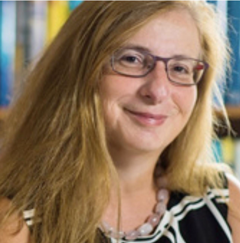
Professor Eleni Stroulia
Acting Vice Dean, Faculty of Science - Dean's Office
Director, AI4Society Signature Area, Vice-President Research Innovation
Dr. Eleni Stroulia is a Professor in the Department of Computing Science, at the University of Alberta. From 2011-2016, she held the NSERC/AITF Industrial Research Chair on Service Systems Management, with IBM. Her research focuses on addressing industry-driven problems, adopting AI and machine-learning methods to improve or automate tasks. Her flagship project in the area of healthcare is the Smart Condo in which she investigates the use of technology to support people with chronic conditions live independently longer and to educate health-science students to provide better care for these clients. In 2011, the Smart-Condo team received the UofA Teaching Unit Award. She has played leadership roles in the GRAND and AGE-WELL Networks of Centres of Excellence. in 2018 she received a McCalla professorship, and in 2019 she was recognized with a Killam Award for Excellence in Mentoring. She has supervised more than 60 graduate students and PDFs, who have gone forward to stellar academic and industrial careers. Since 2020, she is the Director of the University of Alberta's AI4Society Signature Area. Since 2021, she is serving as the Acting Vice Dean of the Faculty of Science.

Dr Péter Szigeti
Assistant Professor, Faculty of Law
Dr. Péter Szigeti received his SJD from Harvard Law School in 2015, and started teaching at the Faculty of Law of the University of Alberta in September 2018. He has held postdoctoral positions at New York University, McGill University and the European University Institute; and he also holds an LL.M. from Harvard Law School (2008), a Master 2 recherche from Université Paris I (2006), and a bachelor’s degree in Hungarian law from ELTE University, Budapest (2005). Professor Szigeti teaches property law, immigration law and jurisprudence. His varied research interests include the role of geographical information in law; the interactions between property law and environmental protection; jurisdiction, sovereignty and territoriality in international law; comparative immigration law; and international legal history.

Bart Verheij
Chair of Artificial
Intelligence and Argumentation,
Head of Department of Artificial Intelligence,
University of Groningen
Bart works on the theoretical, computational and empirical connections between knowledge, data and reasoning, as a contribution to responsible artificial intelligence. Bart does this using an argumentation perspective, often with the law as domain of application. Bart holds the chair of artificial intelligence and argumentation as associate professor at the University of Groningen, a public research university founded in 1614. Bart is head of the department of Artificial Intelligence in the Bernoulli Institute of Mathematics, Computer Science and Artificial Intelligence, Faculty of Science and Engineering. Bart participates in the Multi-Agent Systems group. Bart is co-coordinator of the `Responsible Hybrid Intelligence' line of the NWO Zwaartekracht Hybrid Intelligence project.
Detailed Agenda
FEB 15 AM TALKS
9:00-9:15 — Welcome
-
President and Vice-Chancellor Bill Flanagan, Dean of Law Barb Billingsley, AI4Society Director Eleni Stroulia
9:15-10:15 — Authors and Readers, Humans and Machines: Copyright and AI
-
James Grimmelmann, Tessler Family Professor of Digital and Information Law at Cornell Tech and Cornell Law School
-
Can a computer create a copyrightable work? Can it infringe on one? So far, at least, United States copyright has steadfastly insisted that computers are not people, and that not only can they not be authors, they cannot be infringers either. I will argue that while these rules may be counterintuitive, they are entirely correct under current law as applied to current technologies. Maybe those rules will need to change as artificial intelligence develops, but if so they should start with the recognition of how much copyright already gets right.
10:30-12:00 — The Challenges of Regulating AI
-
Teresa Scassa, Canada Research Chair in Information Law and Policy at University of Ottawa
-
The rapid growth of AI technologies and their deployment in an increasingly broad range of contexts raises some pressing challenges for the regulation of AI. Although some models for AI governance call for attention to key issues in the design, adoption and deployment of these technologies, we are already seeing widespread use of AI without such guardrails in place. Such uses call for a kind of after-the-fact response - including complaints and legal proceedings. This presentation looks at the tension between before-the-fact and after-the-fact regulation, the readiness of our legal system to address AI challenges, and the possible future(s) of AI regulation.
10:30-11:00 — ‘Big Brother is Always Watching:' The Use of Facial Recognition within Law Enforcement in Canada and the Western World
-
Chloé Currie, Masters Student at the Balsillie School of International Affairs
-
Facial recognition (FR) is becoming an increasingly popular form of biometric measurement, permeating the day-to-day lives of global citizens. Some legal policies have been introduced to protect individual citizens from the misuse of their personal data. Recently, FR technology has become progressively used within federal law enforcement. Policies in areas such as the European Union, the United States, and Canada seek to regulate the use of FR in order to prevent police abuse of the technology. Questions regarding the use of FR techniques such as scraping and propriety algorithms highlight the complicated legality of artificial intelligence within the law. The unknowns surrounding the uses of FR and the possible threats on a national and international scale make the implementation of FR systems a highly controversial topic in need of further regulation.
10:30-11:15 — Global Context: How AI already affects the legal profession
-
Bart Verheij, Chair of Artificial Intelligence and Argumentation, Head of Department of Artificial Intelligence, Associate Professor at University of Groningen and Randy Goebel, Professor of Computing Science at the University of Alberta
-
Join international AI and the law experts Bart Verheij and Randy Goebel for an overview of AI and the Law informed by discussion with judges, lawyers and computer scientists from around the world. Learn how AI is already shaping the field of law, and what trends to keep an eye on.
11:00-12:00 — Technical Matters: Opportunities and Challenges in Using AI in the Practice of Law
-
Maura R. Grossman, Research Professor at University of Waterloo and Adjunct Professor at Osgoode Hall Law School of York University, Affiliate Faculty at the Vector Institute and Leslie McCallum, Lexata Founder and CEO
-
Implementing AI at a law firm or in a legal tech business requires technical expertise, as well as an understanding of legal services provision and the law. Join Maura R. Grossman and Leslie McCallum to discuss both the promises for and the obstacles to implementing AI to make legal service more effective, efficient, and accessible.
11:15-12:00 — What Every Lawyer Needs to Know about AI
-
Juliano Rabelo, Director of Data Science in AltaML, Mi-Young Kim, COLIEE Co-organizer, Assistant Professor of Computing Science, University of Alberta and Kyla Sandwith, Founder of De Novo Inc.
-
As lawyers we are increasingly required to analyze massive amounts of data, both client data and caselaw/legislation, in order to accurately assess matters and advise clients. Advancements in AI are quickly impacting how lawyers interact with relevant data allowing them to more quickly, efficiently, and accurately assess and advise their clients. This session will discuss both current and emerging AI capabilities and how they will fundamentally impact the practice of law regardless of practice area.
FEB 15 PM TALKS
13:00-14:30 — But what about the data? Legal Data and emerging opportunities in the Canadian landscape
-
Colin LaChance, Co-Founder and CEO, Compass.law and Mark Likhten, Lawyer, Strategy and Legal Innovation Lead at the Cyberjustice Lab
13:00-14:30 — AI, Law & Humanity: Putting People First
-
Amy Salyzyn, Professor, University of Ottawa Faculty of Law, Lauryn Kerr, Legal Counsel, British Columbia’s Civil Resolution Tribunal, Var Shankar, Senior Manager for Policy at the Responsible AI Institute, Katrina Ingram, Founder and CEO, Ethically Aligned AI
-
Can we design legal approaches to AI that increase equity, inclusion, and access to justice? What does it mean to design laws and legal systems that put people first? This panel will explore ethics, policy, and what it takes to make practical changes in access to justice. Panelists from across disciplines will share their experiences and explore ways to ensure that the law's approach to AI is ethical and human-centric.
13:00-14:30 — Alberta’s Legal Innovation Sandbox
-
Len Polsky, Manager, Legal Technology & Mentorship Law Society of Alberta
-
The environment in which lawyers practise and deliver legal services is rapidly changing, driven by a host of factors including new technology, the emergence of alternative service providers and an increasingly globalized legal market. At the same time, the legal profession is confronted with unmet legal needs of the public, who face barriers to accessible and affordable legal services.
The Law Society of Alberta wants to be proactive in its approach to these pressures and has established an Innovation Sandbox to help bridge the gap between innovators and the legal profession and address regulatory obstacles to innovation.
What is an Innovation Sandbox? What innovations qualify and who is eligible to participate? What does the Law Society hope to achieve and how does it all work?
These questions and more will be answered in this lively session hosted by Len Polsky, Manager of Legal Technology and Mentorship with the Law Society of Alberta.
14:15 — Notes from the Bench: AI and the Judiciary
-
Avril Inglis, Justice, Court of Queen's Bench of Alberta and Co-Chair of the Court's Information Management/Information Technology Committee
14:45 — Changing landscape on Digital Innovation & the Law: a view from government
-
Dominique Bohn, Chief Officer and Assistant Deputy Minister, Digital Innovation Office, Government of Alberta
-
How does Digital Innovation impact the Government of Alberta's approach to justice and related services? What changes to court services are underway, and what's coming in other areas of public innovation? Hear from Dominique Bohn about the rapidly evolving work of the Digital Innovation Office and its projects related to access to justice and other public services.
15:15 — Student Insights
-
Supreet Singh, JD Candidate at the University of Alberta Faculty of Law, Raj Oberoi, Vice President, External, Digital Law & Innovation Society and Sara Parker, Director of Encode Justice Canada, Political Science Student at McGill University, Research Assistant at Network Dynamics Lab
-
Hear rapid-fire notes about the new initiatives these students are leading through the Digital Law Cohort and beyond, to address challenges and opportunities in AI, digital law and legal innovation in Canada.
15:45 — Closing Remarks & DLIS Announcement
- Justin Hjlesvold, Vice President, Treasurer, Digital Law & Innovation Society, Andrew Cisna, Vice President, Communications, Digital Law & Innovation Society, and Hero Laird, President, Digital Law & Innovation Society
DAY 2 FEB 16th
10:00 — Welcome and Introductions
-
Hero Laird & Katrina Ingram
-
Today is about moving ideas into action. Are you passionate about legal innovation, law reform, access to justice or improving legal services? Come get connected to a growing community of changemakers, and help us make a difference.
We want to hear your ideas for reform involving AI and the law, and legal innovation in Alberta. With Len Polsky on hand from the Law Society of Alberta, and Hero Laird on hand from the Digital Law & Innovation Society, we will connect you to specific supports to refine your thinking and move your idea along. We also want to hear from you to identify pain points and opportunities to better support legal innovation and reform efforts in Alberta. We will document them and report back along with proposals for removing barriers and supporting new ideas.
Today's agenda will be adjusted based on the participants who attend, to focus on the issues that matter most to them.
10:30 — Alberta's Legal Innovation Sandbox & You
-
Len Polsky
-
Come figure out the nuts and bolts of using the Law Society of Alberta's new Innovation Sandbox to support new approaches to legal service delivery. This is a chance for 1:1 consultation as well as group discussion.
12:00 — Lunch
12:30 — Legal Innovation Reform in Alberta: The Next 10 Years
-
Hero Laird
-
Alberta’s Legal Innovation Sandbox is a wonderful opportunity. What other opportunities would you like to see for legal innovation in Alberta? What barriers could be removed to support the sustainable evolution of the legal system here in Alberta? Come see the systems map that describes the current state of legal innovation in Alberta, and give your feedback. Following the Forum, the Digital Law & Innovation Society will report back on what we hear at this sense making session. We look forward to working with you :)
13:45 — Closing Remarks
Agenda
Feb 15
| 9:00 am | Welcome from President Flanagan |
| 9:15 am | Keynote James Grimmelman |
| 10:30 am | Panels from Teresa Scassa, Chloé Currie, Maura Grossman, Leslie McCallum, Bart Verheij, Professor Randy Goebel, Juliano Rabelo, Mi-Young Kim, Kyla Sandwith |
| 12:00 pm | Lunch |
| 1:00 pm | Panels from Colin LaChance, Mark Likhten, Professor Amy Salyzyn, Lauryn Kerr, Var Shankar, Katrina Ingram, Len Polsky |
| 2:45 pm | A Note from the Bench (Justice Avril Inglis) |
| 3:15 pm | Changing landscape on Digital Innovation & the Law: a view from government (Dominique Bohn) |
| 3:45 pm | Student Insights (Supreet Singh, Raj Oberoi, Sara Parker) |
| 4:00 pm | Closing Remarks |
| 4:15 pm | Ends |
Feb 16
| 10:00 am | Welcome & Introductions |
| 10:15 am | Moving ideas into action |
| 10:30 am | Nuts and bolts of the Innovation Sandbox and other supports for legal innovation |
| 12:00 pm | Lunch |
| 12:30 pm | Nuts and bolts of the Innovation Sandbox and other supports for legal innovation |
| 1:45 pm | Wrap up |
| 2:00 pm | Ends |




